“God is dead, we have killed him, you and I!”
– The Madman running through the streets in Nietzsche’s The Gay Science

No philosopher, in a field of study with more than its share of polarizing characters and eccentrics, has been more misunderstood than Friedrich Nietzsche. No wider intellectual divide regarding one single thinker is known to history, and perhaps for no one else is there so equal an amount of critics and commentators disagreeing with each other as to whether that thinker be a genius or a madman. Most of the contradictions can be attributed to interpretative discrepancies and problems with definitions, causing different readings of the texts, so rather than show point by point where many of Nietzsche’s readers have gone wrong, something needed but which will not be attempted here, I will summarize the problems by concentrating on two big myths: 1) that he is a nihilist and 2) that he is an atheist. Here I will demonstrate to you that Nietzsche was no nihilist, but rather a lover of life, and furthermore, that he also believed in God.
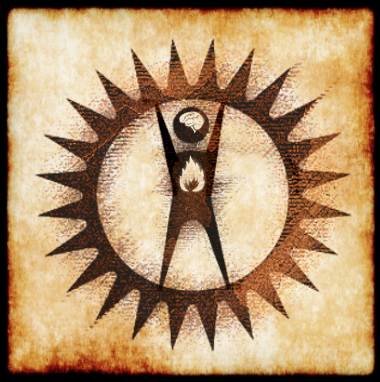
I. Humanism, All Too Humanism
To introduce the problem it will be beneficial to begin with a quick discussion of the word “humanism”. Today humanism is considered to be something antithetical to religion, while traditionally a humanist may or may not be a believer in any deity. According to Google, humanism is:
“…an outlook or system of thought attaching prime importance to human rather than divine or supernatural matters. Humanist beliefs stress the potential value and goodness of human beings, emphasize common human needs, and seek solely rational ways of solving human problems”.
According to Wikipedia, humanism is:
“…a philosophical and ethical stance that emphasizes the value and agency of human beings, individually and collectively, and generally prefers critical thinking and evidence (rationalism and empiricism) over acceptance of dogma or superstition”.
Both these definitions might serve to illustrate the wrong but popular conception of humanism to which I mean to call attention – and which by analogy corresponds to the consensus misunderstanding of Nietzsche regarding God. Both these quoted definitions of humanism are in the most part correct except where they imply that belief in a Creator, or “the supernatural”, is somehow an opposing position. According to how the word was meant to be used by the people who first used it, humanism is a worldview, an “ethical stance” or outlook that is based on the primacy of the individual subject and which emphasizes benefits to mankind, it is a way of approaching Life which may or may not involve a Supreme Being. It is an approach to living and coming to Truth based on classical studies, a human-centered approach to The Good Life, a subjectively-based outlook that in its simplest formulation would say God (or the gods) help those who help themselves.
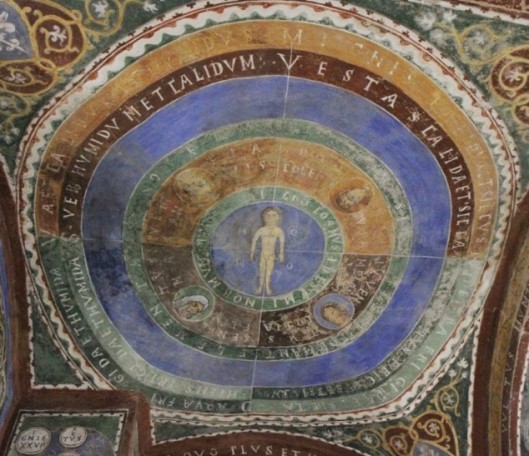
A humanist, by this classic definition, is first of all a champion of human rights and individual liberties, such as the freedoms to choose your job, your mate, your god, your beliefs, where to live, what to learn, and so on. The world is seen as subjective, “egocentric” in that everything should be devised for and revolve around individual human beings. Believing or not believing in God makes no difference as to whether or not one is a humanist, and it is somewhat indicative of Nietzsche’s idea that there is a need for a “revaluation of all values” that today the word has become synonymous with “atheist”, and treated as antithetical with regard to metaphysical matters. In fact, the greatest known humanists of all time have been believers in God.
Now, in the same way that the common, accepted belief is that humanism is atheism, the common, accepted belief is that Nietzsche was a nihilist, and did not believe in God. Some of the main reasons for this erroneous but popular misconception are his being quoted out of context, because of his critics concentrating on isolated passages, because of certain texts corrupted by “editors”, and because of the purposeful dissemination of these and other misrepresentations and distortions in order to lend support for every unsavory cause, from fascism to communism, sadism to masochism, nihilism to atheism, and their kin. In regards to both humanism and Nietzsche, setting the record straight will hopefully not only send you back to restudying the “Prussian with royal Polish bloodlines”, but also make you reassess your evaluation of both humanism and the people who call themselves philosophers and scholars.
To prove all this it will be necessary to first define what is meant by “God”, and because this will require a look at the history of the concept, the next few sections will of necessity be a bit lengthy. Be advised I will actually be leaving out a lot of information in order to shorten and simplify things.
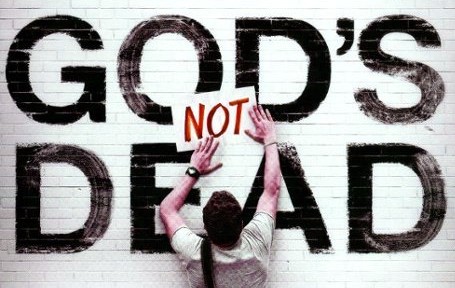
II. The Identity Of The Alleged Corpse
In this day and age, where the term “God” can be applied to any type of being or non-being and remain, if not in concept, at least in name the same, it is first necessary to make some distinction between what is and is not meant by the term.
Since at least Thales men have felt it necessary to separate their epistemological, psychological, cosmological, ethical, metaphysical, and aesthetic views, in a word, their philosophies, from those held and promoted by myth and religion. The historians have suggested a human “desire to know independently of a Creator”, without invoking God, as the origin behind this development. This effort, this gathering of information by way of the senses in attempt to collect facts, without appeal to mythological or other old wives’ tales, and the progress made thereby since, has been called Science.
The quest for objective Truth such as that sought by the method of Cartesian-style introspection may be seen as an example of this kind of “search for the absolute” that presumes no revealed or otherwise mystical foundations. What René Descartes did for knowledge in his day was bring back into relevance that type of “scientific” thinking lost during the so-called Dark Ages and saved by the Muslims, but in actuality has been known to the world since the Pre-Socratic philosophers of BC times, and arguably even before.
We are still not certain as to the amount of previous knowledge which remains lost, a presumption indicated by the evidence from civilizations dated as early as the sixth millennia BC, who were already doing “scientific things”, whether they knew it or not. This, of course, presumes even earlier scientific-type thinking that led to the advancements and discoveries they utilized. As some people do not know they usually write in prose, the ancients like the Sumerians and Egyptians and the rest might not have known they were doing Science, but in their technology, their buildings, and their art, some of which we are unable to duplicate even today, we see clear evidence of the application of scientific principles.
It is not so cut-and-dry then, as the bulk of the historians would have you believe, that Science began only with the Pre-Socratics, and of Descartes himself, it is more accurate to say he was the first major thinker since the birth of Christ that dared to challenge established conceptions of God and the Universe, which is why he has been called “the father of Modern Philosophy”. When God and Creator, or at times, Gods and Creators, and belief therein, became a hindrance, oppressive and demanding and more about death and punishment than Life and benevolence, with evangelical hands and eyes in and on everything, the emergence of a freethinker like Descartes was inevitable.
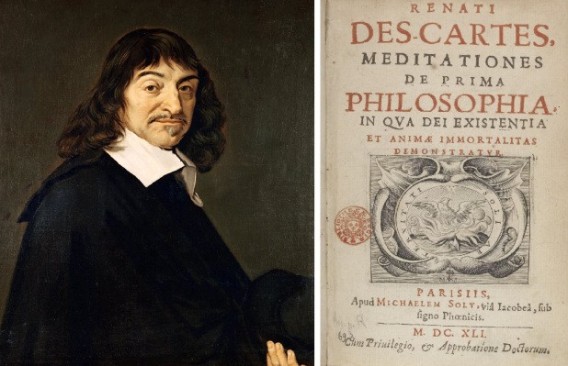
Rather than trace the idea of God from the ancients to today, which space here, and my stamina, will not allow, we’ll will begin with Descartes’ and his contemporaries’ intellectual rejection of the Scholastics. This enterprise is known today as Modernism, which commentators in the main consider a philosophical, historical, and psychological movement based on what have been classified as “Empiricist” and “Rationalist” philosophies. We should also note that we are discussing here a time in history when thinkers had to watch what they wrote for fear of the dungeon, and much has been recorded about authors writing in code or watering down their messages so as not to draw the attention of the Righteousness gestapo.

The classical, ancient idea of God may be understood as descriptive of an ultimate Creator and Origin or all things, if not the Logos, then the fashioner of it. According to The Spirit Of Western Philosophy (Stallknecht And Brumbaugh, 1964):
The personal God of Christianity is described as the Supreme Being. He occupies the highest position in a metaphysical scheme like that of Plotinus. God alone possesses full and perfect reality. (207)
This definition of what is meant by the concept “God” is one fairly universal among most religions and belief systems in the world. The God of the Scholastics, however, which would spawn the Modernist revolution, went quite a bit further:
No creature has the right to say ‘I am that I am’. This is because creaturely beings are not self-contained, they depend for their existence on other things. (ibid.)
Here we begin to see the seeds of human insignificance against which Cartesian philosophy rebelled, if more by example than demonstration. Historically some conception of deity always existed for most peoples prior to Christianity, be it as a sacred animal, Prime Mover, Demiurge, First Cause, Nature, Infinity, “The Boundless”, or as represented by some anthropomorphic figure like Zeus, Jupiter, Odin, Prajapati, Earth/Mother/Fertility Goddess, and so on.
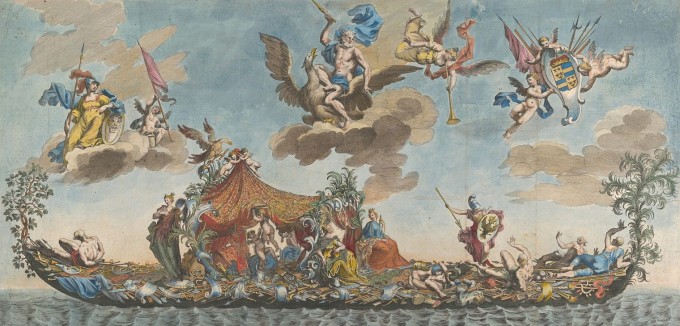
The Christian influence – or we should say, Romanized Christian influence – established a hierarchy among beings and made God into mostly a bestower of punishment and an entity to be feared. This idea of God as something frightful is also nothing new, and likewise has its origins in the ancient civilizations, where every pestilence, storm, drought, earthquake, flood, foreign invasion, and even handicapped child, was attributed to a god exacting his vengeance or expressing his displeasure. Since ancient times the wrath of the holy has been used to instill obedience in the people. Enlil, Marduk, Shiva, Zeus, Jupiter, Quetzalcoatl, Pakal, Bes, Baal, Hathor (the bull Mehet Weret), Puluga, all of them and dozens more either destroyed (or attempted to destroy…) the world, or caused great sorrow, or required human sacrifices, butchering rivals, and so on. From at least the Sumerians to this very day horrendous wars and murderous battles have been fought for, and with, divine approval.
The rulers of society in centuries up to Descartes used this same type of divine authority, ordained this time by a barely fathomable jealous God with a queer lack of foresight called Yahweh (or YWH, or Jehovah, G-D, etc.), to impose all kinds of prohibitions and inflict all kinds of horrors on unorthodox believers and unbelievers alike, and all that in obvious contradistinction to the words of Christ himself, whom they somehow claimed to represent. As before, those in power used the reverence and awe for the deity as a tool for manipulation and control. Individuals in society with ecclesiastical or political clout and power, which were very intertwined in those days, could by use of such authority, and just as in ancient times, enact prohibitions or requirements conducive to their cause(s) and present them to the people as being ordained by God, thereby elevating what were originally human proscriptions or beliefs – or whatever personal or cabalistic fetish – to the status of ordained divine commandments. This type of edification established the basis for the “reasoning” justifying coercion, torture, and conversion by the sword, and more than that, it brainwashed the people into accepting the atrocities, not just as “proper” and “right”, but almost as a new form of entertainment, and as an objet d’art. The phenomenon of the macabre public spectacle, and the accompanying appeal to bloodlust, arose in Man again.
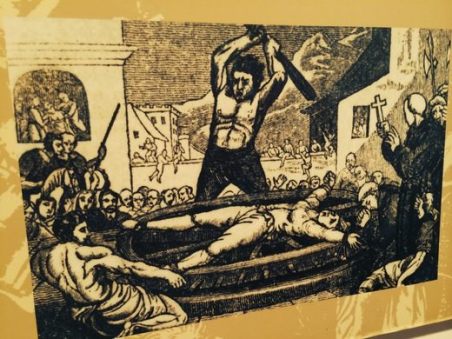
The main problem we see here is, how can we know if a revelation of any kind, a vision of any sort, is really of divine origin? Is it any surprise then that, eventually, mankind would want to know why he could not also describe himself as “I am that I am”, and want to break from the yoke of the unseen rope? After all, is it not a Truth, if any there be, that Man is unlike any other creature, not an animal limited to only instinct, but a being with curiosity, free to deviate from Nature, to seek and discover, and to form ideas in the mind and bring those things into the world? Is Man not just a creator of things, but also, in some very real ways, the creator of himself?
In ancient times the world believed mythology was simply mythology. They were implicitly understood as explanations for the inexplicable. Zeus was not really sitting on a cloud throwing thunderbolts down as lightning, nor did he or his ilk really take human form and impregnate Earthly women, regardless of how fair were those “daughters of men”. Prometheus was not really tied to a mountain to have his liver eaten daily by a bird of prey any more than the real Sisyphus might be seen rolling up a mountain the same boulder which will roll down again by the end of the day. The ancients knew this Prometheus (“Foresight”) myth addressed the practice of divining the future, fortune-telling, often done at that time by examining livers, the lesson being that the future can never be known, and they knew the Sisyphus myth to be a commentary on the often monotonous day to day living. Similarly, God was not ever really a cow (except maybe for Zoroastrianism…), or a goat, or a human with a dog’s or bird’s head, or a sphinx-like being, or a demon looking creature with snakes, or a lamassu. Even in their time, I wager, these myths and mythological beings were understood in their metaphorical sense, as stories meant to produce within the listener understanding of, and empathy for, the particular human condition addressed by the tale.
With the advent of the dogma of Christ (great book), however, men were being told, against their better judgment, and under threat of punishment, torture, and even death for non-belief, that these ancient tales and myths were not only “barbaric” and “wrong”, but sacrilegious as well. The thinking individual was made, better to say forced, to believe in only one God, one that was – or whose Son was – actually here, on the Earth, in the form of a man, born of a virgin. The difference between the “Christian” days and the “Pagan” days is that the pagans and the ancients, while recognizing the powerful destructive aspects of God or gods, at least made it a point to also celebrate that God’s goodness and splendor. They drank and sang and danced and played and so on in homage, and reserved many days and sometimes weeks for merrily praising the benevolent aspects and blessings of the divine. The development, or really regression, with the spread of the new Christianity, was that now what few such festivals and “celebrations” that remained became short and somber events, basically little more than temporary respites from daily fear, pain, anxiety, and intimidation. The happy half of the divine was put on the back-burner.
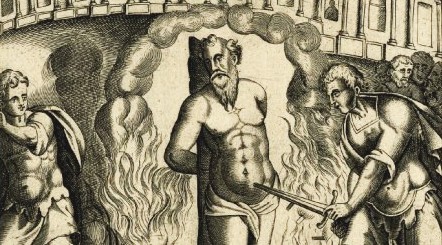
We should make it a point to acknowledge that in this woeful era there were also acts of the most extreme and often unbelievable dedication, commitment, and courage. Amidst the scourge of the rack, the demon and sin hunters, the “missionaries” Christian and Muslim alike who gained converts by killing en masse those who refused to believe, and from the terrified or oblivious, yet blood-loving masses, rose up the one in a thousand uncommonly brave individuals who endured unspeakable ends rather than tell lies, admit to be what they were not, accuse or inform, or deny their beliefs. In some few cases, whole towns chose death rather than deny their God. Such has been, and is, the power of the human spirit.
Sometimes I try to imagine living in that time, and every time I do, only one word always comes to mind: bleak. I imagine, rightly or wrongly, somber people in hoods preaching chastity and goodness at the exact moment others of the same diocese are inserting something somewhere in someone in trying to exact some oath or confession, while everyone in town stops to watch and so has something to talk about over porridge. I picture the torturers wearing large crosses and praying as they “fix” another victim.
They say disease has a mental aspect, and so it is no surprise that in the rush to cleanse the souls of the populace the intelligentsia of the time forgot to cleanse themselves, and their streets. Elementary ancient knowledge, simple inventions and technologies like general sanitation, basic plumbing, and requirements like the need for clean water, as well as the ancient medical knowledge, was lost. Where once it was common for well-fed pagans like a Socrates to live seventy, or eighty years and more, and medicine was useful and effective, and had a lot to do with the longevity in that Golden Age, now “healers” instead used things like hot irons and coals, leeches, holy waters and salves, and exorcists. Apparently they forgot the technology, like I heard some NASA fellow say recently about the knowledge of how to go to the moon. We have not been back, and cannot go back to the moon very soon he said, because the tapes and books have somehow disappeared, and we forgot how.
The Black Death, The great plagues and poxes, the impalings and beheadings, belief by force and village burnings, it is not good when these are what characterize your time. We can be sure people enjoyed some things too, laughed then too, fell in love then too, but if the first hand reports, testimonies, and confessions are true, and the representative art of the time, and our intuition, are correct, then all indications are it was not a good time in human history, to say the least. It makes what Descartes and those like him were doing at the time that much more impressive.

None of this is coincidental because prolonged pain and agony, and so suffering, were central to this oxymoronic Believe-Or-Die Christianity. We must suffer as did Jesus, was the credo, and more, Life itself should be seen as suffering, as punishment for that thing in the Garden, never mind that other little thing about forgiveness. As Erich Fromm puts it in Dogma Of Christ:
The concept of Jesus held by the early community was that he was a man chosen by God and elevated by Him as “messiah” and later as “Son of God”…in only two ideas of faith do we find something new: in the fact of his exaltation as son of God to sit at the right hand of The Almighty, and in the fact that the messiah is no longer the powerful victorious hero, but his significance and dignity reside just in his suffering, in his death on the cross. (52, my emphasis)
Very important here is that Fromm, ever the psychoanalyst, believed that the elevation of man to God on the part of later Christians was an “unconscious wish for the removal of the divine father” (ibid. 54). Removal of God and death of God, you will note, have the same end goal in mind. If people, with right living, could be gods, Fromm said, then “God was deprived of his privileged fatherly position of being unique and unreachable” (ibid. 54). Belief in God, or that humans have a connection with God, or “spark” of God, however, does not necessarily imply making one’s self into God, and here Fromm reads perhaps a bit more into these religious practices than the evidence warrants. Christianity does make a Man into a god though, one which, as you will see, is the type of “ungodly God” that Nietzsche will declare to be contrary to the real God.

As we speak the percentage of atheists rises, not coincidentally, at about the same rate as do believers in outer space aliens. Today only one in three Britons considers him or herself a believer in a God, for example, while over half believe extraterrestrials, or aliens exist, although to this day the existence of not one of them has been confirmed. Instead of an unknown God creating the world, in all seriousness, and for all modern “advancement” – and almost like a parody – instead today it is extraterrestrial humanoids seekers try to find when looking at the stars, and this is considered somehow an advancement. As snickering atheists ridicule belief in any type of deity out of one side of their mouths, out of the other they spew concepts with even less scientific and historical basis in reality. God or gods in some form being the ultimate cause of all things at least has a record as long as known history. The surrogates the atheists use for ultimate causation are really themselves neologisms beyond definition, which often defy common sense, and which are no more than imitations and substitutes for a deity.
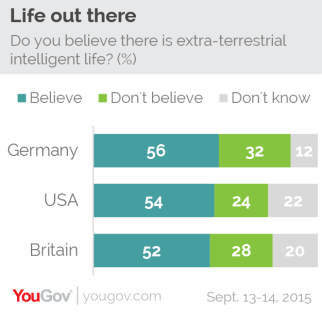
The “primitive” ancient ideas would say, for example, that such-and-such God or gods created the world and Man. The “enlightened” of today, straight-faced and so with no tongue in no cheek, will tell you the world was created by a “Big Bang” power, which for no known reason erupted from a minuscule, in fact initially non-existent point of nothingness, originating in negative time and involving further incomprehensible things (the Scientific Saints, or Theoretical Handmaidens) like negative space and anti-particles, all fictions with no empirical proof at all. From this impromptu explosion, the cause for which no reason is ever given whatsoever, on their own initiative and without a planner or designer of any kind, these scattered particles originating from nowhere gravitated together in just the right way in just the right consistencies to form the myriad of different things in the universe. By this same unguided process these “substances” went on to eventually bring forth into the world living plants with sensations that grew, and animals with nerves and feeling, temperature control, and electrical heartbeats that ate, moved on their own, and multiplied “by nature”. Derived from these primordial creatures, through a slow, painful, and laughably impossible macroevolution we are told, eventually arose mankind. Gravity, electricity, magnetism, amino acids and their reactions, and so on, while we have some idea how they work, and can use them to some degree, we really know little about any of them, and what they really are. When appeal is made to gravity, or electro-magnetism, or chemical reactions, and the like, the imagined object is of the same ontological nature as the gods. As I have said before, Gravity as cause is no advancement over Atlas as cause, and it is difficult to take seriously talk about what life may be like on other planets when what causes a seed to sprout is still an unknown mystery.
We should probably agree with Jacques Vallée, who has theorized that what were angels then have become aliens now, and that it is only the object of the beatific vision – or delusion – that has changed. Now, in the 21st century, genetic engineering is a reality, and we are on the cusp of creating animals and human beings. Even more frightening is that people are actually paying, with real money and into perpetuity, to keep their bodies on ice, literally frozen until, they hope, technology can bring them back to life, like a modern, more expensive version of mummification. But does Man really want the job of being a god?
Complicating matters even more, in determining what is meant by “God”, is that many of the earliest followers of Christian philosophy, such as the Essenes, had an entirely different conception of Christianity, one which barely resembled the religion it would become. Resulting from the aristocratizing of the original Christian thought was that, through among other things the inaccuracies of “word of mouth” renditions and the problems with translation, the primordial Christianity was transformed into a completely different theology, philosophy, and so religion. No longer was Jesus depicted as a man elevated to having God-like status, now there was a God who had descended to become Man.
Under Constantine, Rome embraced the Christian faith and spread it throughout all its colonies, and as it grew in scope from its more traditional beginnings it eventually evolved, even transformed, into a rigid set of dogmas that was to be a direct cause of Cartesian introspection and doubt.
About the middle of the second century, Christianity began to win followers among the middle and higher classes of the Roman Empire. Above all, it was the women of prominent position, and merchants, who took charge of the propaganda. (ibid. 59)
By the time of Augustine, Aquinas, and the other Scholastics, after the fall of the Roman Empire and beginning in the so-called Middle or Dark Ages, Europe was enduring starvation, oppressive religion, invasions, and disease. Yet the clergy, perhaps as much a cause of the darkness of the times as any other, would retain complete control over European society until the Renaissance. Muslims killing Christians and Christians killing Muslims was all that kept the faithful aboard, on both sides. Islam was determined to convert everyone it could and Christianity sought the same.
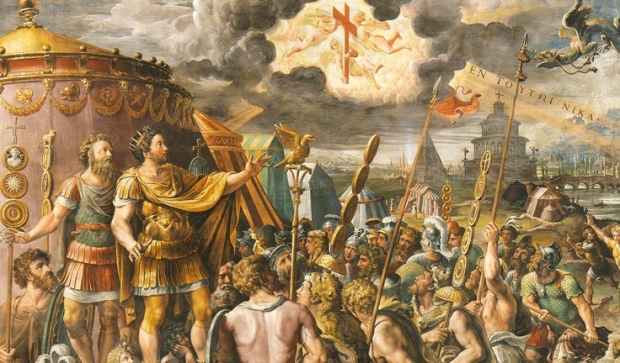
The original Gnostics denied Jesus was a real man. The later apologists would add that God is not the originator of the world, but only the personification of divine intelligence, and for this theory the Pre-Socratic Greek concept of the Logos was adapted to fit the bill; what the Greeks had explained as the order of the Universe, and the factor behind human communication, had become altered to mean the Word of God.

Dogma is, according to the usual psychological definitions at least, an expression of compulsive thinking, ritual, or some other unquestioned action. When people have no unifying cultural thought pattern, or overriding archetype, or reasonable or scientific explanation regarding some thing or event, dogma is what arises to fill the gaps. The Scholastics and theologians prior to Descartes used the corrupted idea of Christianity, for instance, to bring forth a doctrine of beliefs and taboos that had, as its main attraction, a special place in the afterlife for the weak, the meek, the cowardly, the poor, the downtrodden, and the diseased. It was Judaism for the Gentile masses. The more you suffer now, the more you will be rewarded later.
The doctrine of repentance, the result of the belief that for some reason, or to obey some cosmic balance (or to tie up the story…), Jesus Christ was made to die on the cross for the purpose of redeeming human sins, made it so that now even the admitted, most wretched sinner (like Augustine and Paul, for instance…) need but accept Jesus as Lord, confess his transgressions, and then his place at God’s feet, in an afterland of gold, could be secured. Such a dogma was appealing, and satisfying enough, to many, but poison and even insulting to growing and expanding inquisitive minds.
Descartes broke completely with the Crusading religious imperialism of the Middle Ages “and he made his independence explicit” (Stallknecht, op. cit. 240). He was “inspired by the thought that the human will is absolute and master of its situation” (ibid. 252). Influenced by thinkers like Pythagoras, Euclid, Plato, Augustine, Copernicus, Kepler, and Galileo, Descartes dared to attempt to restore rationality to the human mind by emphasizing man’s connection with – not hellfire and brimstone separation from – the Almighty God. Even though students of history know this is the classical understanding of Man’s relationship to God, such thought as this was, to the somber Scholastics, high treason, even blasphemy.
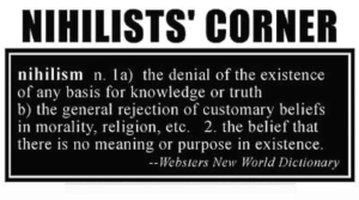
Nihilism is sometimes understood as the belief that there is nothing after this life. While Nietzsche spent little time discussing any sort of afterlife, he used lots of it researching and writing about the nature of Truth. We need only recognize here that just because someone does not believe the standard guesses about will happen after death does not necessarily mean he or she believes nothing happens after death. In the same way, just because someone rejects an existing claim to Truth does not mean that person is against the notion of Truth, in fact, a rejection of a hypothesis is itself a hypothesis.
The Scholastics believed that what Man endures is decided by the grace or wrath of God, in a word, by fate, or destiny. Without nullifying totally the concept of the omnipotent, omniscient, omnipresent God – an often used definition of the Supreme Being that need not be necessary – Descartes challenged this dogma of determinism by affirming and even emphasizing the existence and value of human free will. In fact, for Descartes it is only by extension of this free will that Man, through reason, can come to know God. In Discourse On Method he wrote:
What is called good sense, or reason, is by nature equal in all men…the diversity of our opinions, consequently, does not arise from some being endowed with a larger share of reason than others, but solely from this – that we conduct our thought along different ways, and do not fix our attention to the same objects. For to be possessed of a rigorous mind is not enough; the prime requisite is to rightly apply it. (The Rationalists, 1960, 39)
Descartes’ Method of Doubt, also known as solipsism, by which he would try to strip himself of everything he thought he knew to see what he could know for sure and beyond doubt, left him epistemologically bare except for knowledge of two things – himself, and God. Based on these assumptions, he would build his philosophical system. The knowledge of self, the “cogito” or “I think” as he called it, Descartes said is known before any confirmation by the senses. This self-awareness, or knowledge of one’s own being, he claimed was placed in him “by a nature which was in reality more perfect than mine…which was God” (ibid. 64). He argued that even if he is being deceived about his own existence, there is something definite there that is being fooled. Descartes said he can therefore know for sure he exists, and since this knowledge did not come from his own mind, or from the outer world, it had to come from a “more perfect reality”, or God.
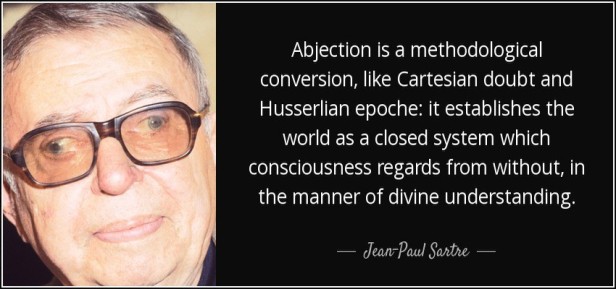
Man is thus connected somewhat to this more perfect reality, at minimum an extension of God:
All the things which we clearly and distinctively conceive are true [and] certain only because God is or exists…our ideas or notions, which to the extent of their clearness and distinctness are real, and proceed from God, must to that extent be true. (ibid. 67, my brackets)
For Descartes God is a substance “infinite (eternal, immutable), independent, all-knowing, all-powerful, and by which I myself, and every other thing…exists”. Although this idea stems from Augustinian tradition, and despite cited evidence to the contrary, such as his letter to the priests in the beginning of his Meditations, it would be a mistake not to recognize how different Descartes’ ideas were from the Christian dogma popular in his day. At the time his views were very unorthodox, and his attempt to logically, by reason and rationality alone, prove the existence of inborn or a priori knowledge, in contradistinction to the opposite “Empirical” view that all knowledge must originate with senses, is why he is known as a Rationalist. Most theologians in his time either believed in, or were gravitating towards the view that belief in deity had to be a matter of faith, and not something that could be proven scientifically. His contemporaries were moving away from the type of exegeses that had been offered by Christian philosophers like Aquinas and Anselm who had attempted similar rational justification for the existence of God in the past.
Just like those priests that believed God could be proven by reason, Descartes gave what we know as the classic cosmological and ontological proofs for God’s existence, for the deity that he assumed to be the reality behind the idea evident to his mind. To come to this conclusion he first distinguished the two type of substances that can be the objects of contemplation:
The thinking thing [res cogitans] is for Descartes a purely spiritual substance. It is not a body or living organism that thinks. Thought – and accordingly the thinker – is absolutely unextended. (Stallknecht, op. cit. 26)
Compare the res extensa, or extended things, which have length, breadth, extension in space, and so on, with these res cogitans, or objects of thought, which have no such phenomenal or 3D reality and exist only, like Platonic ideas, in the mind. That there are separate extended things and things of mind, or two different types of objects of knowledge, is why, primarily, this type of reasoning was later to become called dualism.
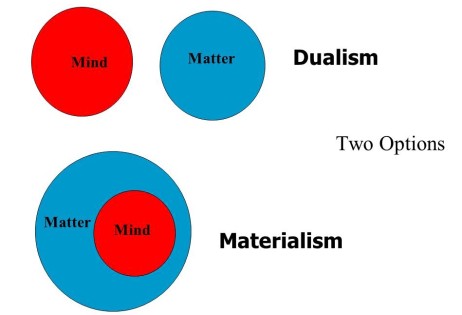
Therefore, to Descartes there is a portion of God, the nous or mind, or thinking portion, that is manifest a priori, and that exists innately in the human psyche. This being so, religious dogma and blind ritual (and obedience…) are not the keys to comprehending or knowing the divine. Descartes believed, on the contrary, that by the power of thought alone God may be known, and proven.
Many misconceptions have arisen resulting from this dualist understanding, most of which concern the possibilities of interaction between these two types of extended and thinking “things”. I would go so far as to say that it is the only real problem about dualism that critics have discussed. As the objection goes, If the human soul and/or mind are examples of thinking things, mental things or things of the psyche, and the brain and the body are extended or physical things, how is that they can communicate one to another, something which our living day to day assumes must happen? Philosophers call it the problem of interaction.
Descartes attempted to answer this question, and even went so far as to give this interactive nexus a physical location, in the brain, the pineal gland to be exact. It is also often forgotten by the critics of this Cartesian dualism that Descartes “had been very close to the Spinozist [i.e. pantheistic, monist, Vedic] solution when he asserted that God is the only true substance” (ibid. 277). Not only is this true, but what Descartes believed was nearly identical in its essentials to the ancient ideas of deity from Hellenistic Greek times, and arguably, even earlier. If the primary substance (ousia) is God substance, and God is a mental substance, then objects of the mind, especially insofar as they are incorruptible, imperishable, and unchanging, are more real than the always in motion, deteriorating, finite and mortal objects of our sense perception, or phenomena (ta phainomena).
Plato, who might be called he first Rationalist, talked about a nearly identical scheme, and Aristotle his student, who might be called the first Empiricist, used a similar line of reasoning:
Aristotle [believed] the senses to be reliable, and that we must rely on their deliverances for our knowledge of the world..Although Aristotle had insisted that “not everything that appears is true” (Metaphysics 1010b2–3), he also distinguished between appearances (ta phainomena) and sensations (aisthēseis). Each of the senses has its own proper objects (such as color, in the case of sight) and our grasp of these “is [always] true or [at least] admits the lowest degree of falsehood” (De Anima 428a,b). It is when we make judgments about these that we can fall into error (DA 430a27–28; Kalderon 2015: 68–70). Aristotle also insists that “no one can learn anything at all in the absence of sense” and that even when we are not actively perceiving, our thinking remains dependent on sensory images (De Anima 432a7–9). (See Here)
Such a metaphysics and indeed, basis for epistemology, is nothing less than a restatement of Plato’s ancient doctrine of the Forms, which if you remember states that the form or the idea (eidos, idea), is more real than the changing phenomena, the representations of these archetypal forms we observe with our outer five senses. Whereas for Plato the ideas are what are most real, and the objects of sense are incomprehensible without them, for Aristotle the ideas and the objects of perception are simultaneous and assume each other. Kant would, in later years, adopt a similar compromise position. What we can notice, again, is that after more than two thousand years there remains a distinct idea of a God more or less consistent throughout the ages. The explanations change, but the transcendence behind it is the same.
Baruch Spinoza the “monist“, often contrasted with Descartes the “dualist”, may be seen as having followed a similar intellectual tract. Spinoza said that when he uses the term “God” he means an unlimited being, “a substance consisting in infinite attributes, of which each expresses eternal and infinite essentiality (Ethics, in The Rationalists, Definition VI). In the alleged “drastic move” from dualism to monism, another false dichotomy, what had developed with Spinoza was merely a seeing of the very same God again, only from a different point of reference.

In Proposition XVII of the Ethics, Spinoza says that “God acts solely by the laws of his own nature, and is not constrained by anyone”. Lack of constraint implies freedom, so why this is supposedly contrary to Descartes’ idea of a freely acting God is not easy to explain. For Spinoza, God cannot act in any other way than he does; for Descartes God is free to act as He chooses. Although Spinoza makes God a determined being, while Descartes says God has free will (and is the source of human freedom as well), both agree God is identical in essence and existence, and both agree things cannot happen any other way than they do. God’s intellect “in so far as it is conceived to constitute God’s existence, is, in reality, the cause of things, both of their essence and existence“, and this God is “the indwelling and constant cause of all things” (The Rationalists 195-196). There can be little doubt that the idea of God, as understood by both Descartes and Spinoza, is one and the same, and not really different from the god idea of the ancient Greeks.
I will use an analogy to prove this last point further. By the act of my writing this essay, am I using my free will, or am I rather living out a pre-determined process? What seems like a simple question, one pertinent regarding, and applicable to, nearly all human action, is difficult to answer, and was even considered insoluble by no less an intellect than Immanuel Kant. Whichever doctrine I choose to accept – and I accept free will because it at least appears or seems like I make my own choices – nevertheless the fact remains that I am indeed writing this paper, and doing so takes conscious effort. By my performing the required actions with full consciousness, by being aware of the activity’s progression as well as my active participation in it, and by my being able to at any time wad up these papers and trash the whole idea instead, I must conclude that free will is for me a proven empirical fact. I must act as if I am free, at least because I know, or can imagine, what it would be like to not be free.
Postscript: Yes, the results of this endeavor could not turn out any other way than they have (oops…changed that word…during editing it was will), but that does not mean I did not make this effort happen. I am at least its direct, or efficient cause.
So, while it is difficult for me to conceive by what criteria allegedly opposing views like those of Descartes and Spinoza are said to have imagined God to exist in different ways, all we need to agree on for now is that they both acknowledged a Supreme Power evident to the mind, and that both were really just describing two necessary sides of the same metaphysical Coin, in fact related to one another “as the convex and concave ‘sides’ of a curve, as two genuine aspects of one and the same thing” (Stallknecht, op. cit. 277).
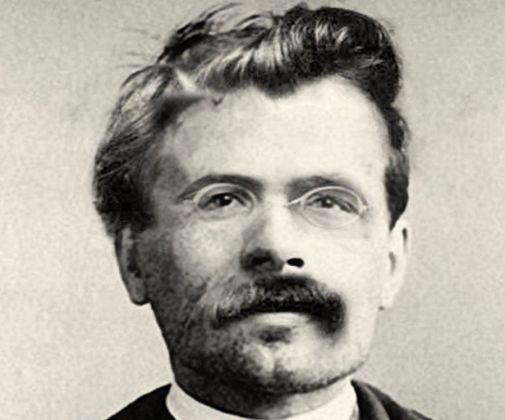
III. The Nature Of God
The dualism of Descartes descends from a line of philosophical thought ranging from Plato and Aristotle through to Aquinas and the eventual “idealism” of Leibniz, Berkeley. Fichte, Kant, and so on. Monism such as that of Spinoza may be seen as having its ancient origin in philosophies such as that of Heraclitus, coming to us in history through the writings of the Stoics, and continued to the present day by the works of thinkers like Schelling, Schopenhauer, Nietzsche, Bergson, and the “existentialists” such as Heidegger, Sartre and Kierkegaard.
I will concentrate the rest of the effort here on the “left wing” of what is Will Durant’s “philosophical tree” (see image below) so that I may eventually arrive at Nietzsche. Regarding thoughts on God, begrudgingly I will have to, for the sake of brevity, omit many important empiricists and idealists, but if this topic of the meaning of the God concept interests you further, I can suggest Lucretius, Francis Bacon, Thomas Hobbes, JS Mill, David Hume, Herbert Spencer, William James, Bertrand Russell, and even CS Lewis as having interesting and productive things to say on the matter.
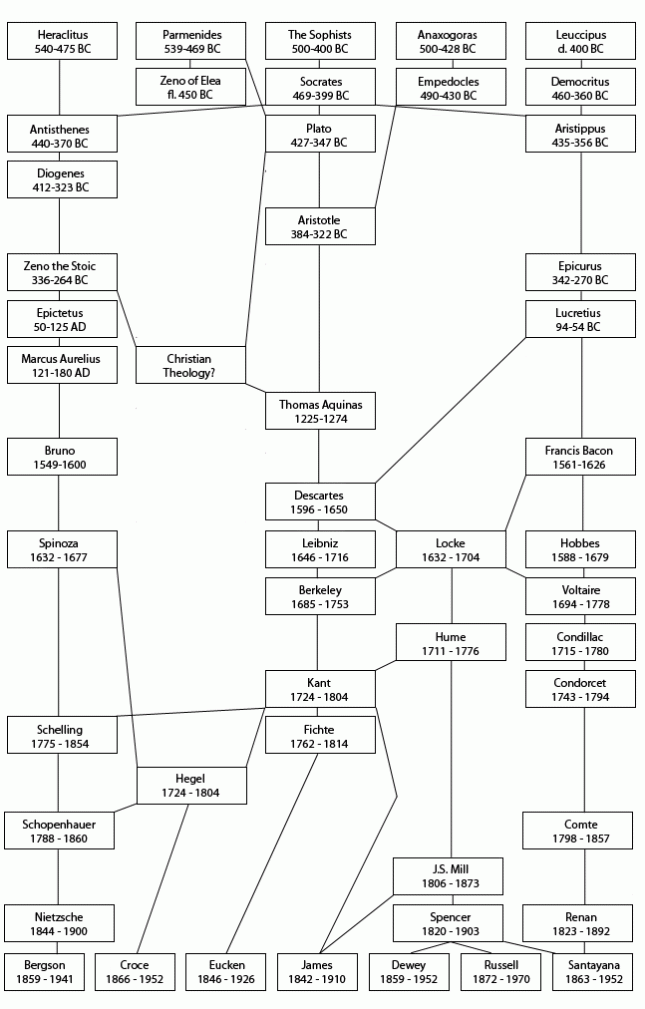
Any attempt to trace the history of the idea of God must eventually tackle the questions posed by the common historical allusions to the concept, or idea, of “Nature”. This Nature has stood as a surrogate or prosthetic for God in many otherwise atheistic or God-less philosophies. As point of fact, many thinkers have used this Nature concept as a causal factor, even the primary causal factor – cause of all causes – and as such use it as a synonym for, and as interchangeable with, the idea of God. A few moments then must be spent in defining what is meant by this Nature.
Aristotle wrote of, and defined, a word called phuse, or phusis. He gave seven meanings for this concept, and it is from where we get our present word “physics”. The seven meanings are:
- Origin, or birth
- Source of movement, or Change
- The primitive Matter out of which things are made
- The Essence, or Form, of natural things
- Essence in general
- Essence of the self-caused
- God, or deity
Today we have translated this word directly as “Nature”. Most important for my thesis here is that Aristotle said definition 7, or phusis or physis meaning God “encompasses all the others by definition” (Collingwood, The Idea Of Nature, 81). If we consider Aristotle’s seven definitions all together for this “phusis”, then Alexander’s tutor’s idea of Nature or God, if but for him a Prime Mover perhaps, was nevertheless, ontologically speaking, basically the same as that offered by Modernists like Spinoza and Descartes.
This identifying of God with Nature is as old as known human history, originating with animal and mother goddess worship and becoming associated with elements and atoms and infinity and such as early as the time of the Pre-Socratics, 500 BC or so. Aristotle being one case in point, but representative of other similar worldviews, it seems that many times, when theorists speak of Nature, they are nevertheless acknowledging a distinct transcendence behind human activity. The point to remember here is that religion, or the organized, ideological explanation of this transcendence, in its true form, is evident, and can be evidenced, independent of any particular dogma or mythology. When you hear the word Nature, especially when it concerns causation, you can bet your bottom dollar this is just a pseudonym, and stand-in, for God.
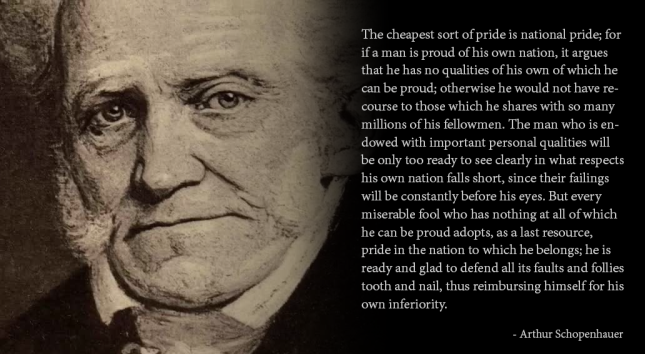
IV. Schopenhauer’s Half Full Influence
Arthur Schopenhauer is often introduced as being one of history’s greatest pessimists but well, the good news is he one of the most underappreciated philosophers of all time. He combined wit with insight and a quick-paced writing style uncommon especially in his time and in his native Danzig, now after WWII located in Poland. His philosophy emphasized the importance of art and the primacy of the will, and he defined religion as the “Metaphysics of the Masses”, predating Marx’s mass opiates. It was Schopenhauer, more than any of his other influences, that had the most affect on Nietzsche’s thought, as well as, I think, his literary, or at least, presentation style.
Not always patient with myths, and best described as skeptical regarding theological matters, it ought to be mentioned that in his later years Schopenhauer began to see the positive significance of religious and ritualistic-type practices. He wrote, in his World As Will And Idea, for example, that “The controversy which is so…carried on in our day rests on the failure to recognize the allegorical nature of religion”.
For Schopenhauer, ultimate wisdom is something very similar to the “release” sought by the Vedic Hindu and Buddhist, and he did have quite a bit to do with the introduction of concepts such as Nirvana and Oneness to Europe. Maybe only Blavatsky did more to educate the West about the East. He understood Nirvana correctly, for instance, as a “coming into being”, as a merging with the “world-will” which, if you think about it, might be what you end up with if you follow the Oracle at Delphi’s mandate to “Know Thyself”.

If you consider that Schopenhauer saw death, like many do, as a “release” from the good-evil, light-dark, good-bad “perilous dichotomy” of life, a proposition implicit in the doctrine that Life is something that should be overcome, you will begin to understand the type of alleged or sham “virtues” Nietzsche would come to call “life-denying”. The catechism Nietzsche would rebel against is not that concerning “God”, per se, and definitely not that regarding Nature, or Truth or reason, but rather his jabs were directed at the dishonest theorists claiming to know the unknowable, and at the self-righteous charlatans abusing authority and pretending to be doing God’s work. The asceticism of the East, such as presented to the Western world by Schopenhauer, is exemplary of the type of anti-god, therefore anti-religious target, at which Nietzsche aimed his “Maxims and Arrows”.
Schopenhauer expressed some confusion concerning the distinctions Christianity makes between the man who is good because he believes in the popular conception of God and the man who is good but holds no such belief. Schopenhauer even “feared society”, “He longed for peace, and everywhere he saw strife” (Durant, 261).
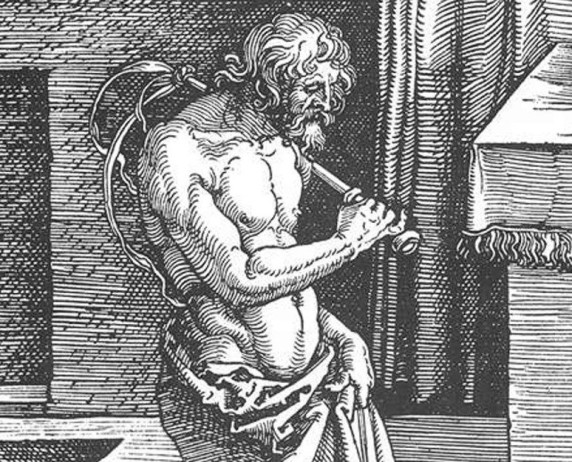
Like the Brahman spoken about by Voltaire, it seemed to Nietzsche, probably rightly so, that Schopenhauer was giving up, so to speak, and was choosing blissful ignorance rather than unsettling and, perhaps, uncertain knowledge. Apparently clear is that both Nietzsche and his mentor Schopenhauer rejected the Christianity of their day because they saw in it anti-religious sentiment. Who is more worthy of Life, they would ask, the pious denier of it, or the thinking embracer of it? Who more celebrates the works of God?
Verily, the main idea behind the “to hell with religion” attitude erroneously taken (or understood…) as atheism is that if these people are the ones going to “heaven”, then I will take my chances in “hell”.
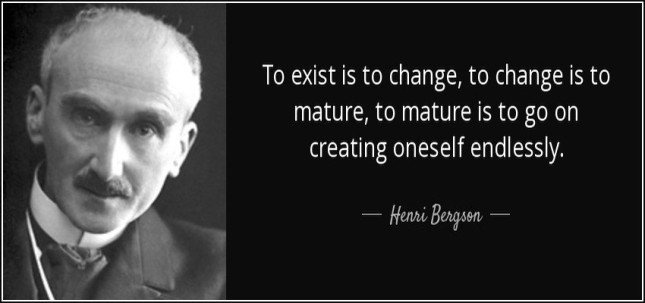
V. Bergson And the Human-Centered Universe
Summing up the classical understanding of religious belief, and the subjectively understandable idea of God, Henri Bergson wrote that:
We must go beyond both points of view – mechanism and finalism – as being, at bottom, only standpoints to which the human mind has been led by considering the works of men…there is a design in things, but in them, not outside, an “entelechy” – an inward determination of all points by the function and purpose of the whole. (ibid. 343)
Although he follows Nietzsche chronologically I present Bergson now because he clarified many of the too-often misunderstood aspects of the Nietzschean theories. Bergson insisted, for instance, that the various philosophies the world has seen have had more in common than they have held apart, and said that philosophy can only progress by taking the “modicum of truth” each has to offer and combining these Truths together to establish a more coherent Philosophy of Man.
While at first glance it might seem that any talk of a “coherent” or “consistent” philosophy, or system of any kind, would actually be inconsistent with Nietzsche’s position, such criticism may be countered by mentioning that, if this system be in constant flux, amenable, and driven, as Feyerabend would later say, by “the spirit of anarchy”, then such a philosophy could surely be reconciled with Nietzsche’s beliefs.
All the different philosophies and theologies concerning God can be seen as separate subjective interpretations of a singular idea of transcendence which some have called, or have given the name, “God”. This God is noticeable, as I have tried to indicate here, under many different disguises. Nature, Prime Mover, Logos, Universal Mind or Mind itself, Natural Light, Supreme Being, First Cause, and so on. It is primarily a Power (dunamis), an intelligent Energy (energeia), and this Power may be observed in action today as that which causes all literal and figurative seeds alike to sprout, and in animals, which begins the heart’s beating and, more than that, it is what is “behind” our mind, the inner self that both notices the germination, birth, or endeavor, and “thinks” about “Why?” and “How?” Human beings are then representatives of deity in, if nothing else, their persistent desire to create, and their open-ended possibilities. This is hinted at by Bergson:
God and Life are one. But this God [each individual’s concept of God…] is finite, not infinite – limited in [I would say rather, “because of”…] matter, and overcoming its inertia fully, painfully, step by step; and not omniscient, but groping gradually towards knowledge and consciousness and “more light”. God, thus defined, has nothing of the ready-made; he is unceasing life, action, freedom. Creation, so conceived, is a mystery; we experience it in ourselves when we act freely, when we consciously choose our own actions and plot our lives. (ibid. 346, my brackets)
This God defined as the total sum of human experience, no less and no more, is an attempt by Bergson to build on Nietzsche’s claims and reestablish Man as as the ultimate creation of God and center of the Universe, a clearly humanistic worldview that had been mostly buried since at least the Copernican Revolution. Earlier I mentioned that the classic definition of God’s being omniscient, omnipresent, and omnipotent need not be the case, and Bergson’s God concept can be seen as one such exception. God need not know everything, or be able to do everything, or be able to be everywhere at once. In order to be God, all He need be is most knowledgeable, strongest, and in more places than anyone or anything else.
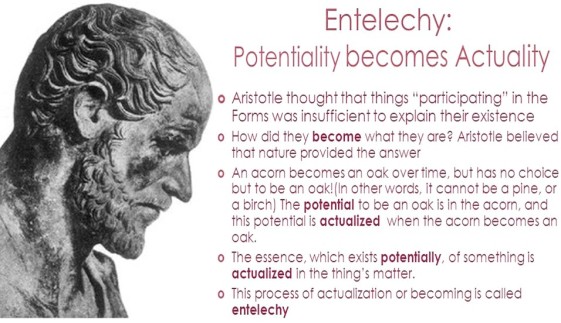
Again we can recall Aristotle, who spoke about substances (ousia) having an entelechy (entelecheia), or an inner-working vital principle, sort of what makes things into what they are and do what they do. Even more interestingly, Aristotle (and also perhaps the Platonic, as well as the Peripatetic school) postulated a second entelechy, which is best defined as the inner working, vital principle of the other vital principles. This too, I think we can see, points to a cause of all causes, a genetic plan behind all genes, a Master Planner and Creator.
Along with William James, Chateaubriand, and William Blake, as well as Nietzsche, Bergson can be seen as part of a movement, a Romantic-style protest against standard or orthodox thinking, a protest to be understood not as critical of thought or reason as a way to enlightenment (as it is often portrayed), but rather as a push against those cognitive enterprises that would demand of Man a type of computer-programming approach to knowledge requiring little more than accepting data as true and then calculating results based on known formulas. There is something disturbing about a slovenly, unquestioning acceptance of the status quo, and with the assumption that toeing the line is necessary to get ahead, to get good job/grade/criticism, and let’s not forget, satisfy peer review.
True inquiry must question not only the data, and the accepted premises, but also what is meant by the very words “rationality” and “reason”. This way of thinking is the same search for Truth philosophers have all known – and wisdom they have loved – since antiquity. Its collective influence has affected the objects of our perception and thoughts alike; both material things and our ideas have, by this following-up of curiosity, expanded in quantity and become enriched. One could say we have been given more freedom of expression thereby, and so, the leash that tethers us to convention, and perhaps our Creator, has gotten longer. This type of philosophy is clearly a Humanism, one that also emphasizes creation as a defining human ability, and is, I suggest, the predominant overriding principle in the works of Nietzsche.
The significance of all this here, my “point of all this”, is that what God is, meaning as any of us know or deny Him, has always been, and must always be, the result of his being interpreted through the screen of some individual’s (more or less) rational human faculties.

VI. The Birth Of A Nietzsche
Friedrich Nietzsche was born on October 15, 1844 in Röcken, Prussia, the son and grandson of Lutheran ministers. His first book was The Birth of Tragedy Out of the Spirit Of Music, shortened to Birth of Tragedy (1872). In this work of genius Nietzsche brought to the forefront of philosophy and art criticism the “Dionysian” elements of humanity, such as passion and desire, whereas before him most historians and critics de-emphasized this aspect of Man in favor of emphasizing and elaborating instead on the “Apollonian” – meaning the cerebral, or rational – side of human nature.
Apollo as portrayed by the ancient Greeks stands for knowledge and wisdom, the sun and light, and cerebral human enterprises like language and rationality; Dionysus, as also portrayed by the Ionians, stands for song and instincts, the spiritual and the night, and the passionate human enterprises like ecstasy and desire. It seemed to Nietzsche that the thinkers of his time forgot about the human qualities of power, intuition, passion and the other emotions, and the many more “natural” and/or “animalistic” virtues. His contemporaries dedicated most of their time and research instead on the cerebral aspects of existence, and Nietzsche thought this was a mistake, and nothing less than a denial of the very important, life-affirming, “primal” aspects of human nature.
It is arguable that no aesthetic philosophy has ever been both more original and more controversial at the same time than Nietzsche’s handling of the Arts, in particular his delineation and explication of these opposing Apollonian and Dionysian aspects of Man. Right brain-left brain, emotion vs. reason, spontaneity vs. careful analysis, classicism vs. romanticism, all these and many more dual-aspects of the human creative process, if not invented or established by Nietzsche, became elevated by his works, beginning with Birth of Tragedy, to subjects of serious scholarly and theoretical consideration.
Nietzsche’s writings, if read in order of their appearance, give us clear indications as to the progression of his thoughts and ideas. In Birth, for instance, we see distinctly Nietzsche’s own solipsism, his personal, Cartesian-like desire to try and find out the things he could know for sure, unprejudiced and from all points of view. Rather than to simply look at the “presented” face of the play, prose, poem, artifact, ethical consideration, or other object of inquiry anew, Nietzsche endeavored to sort of flip everything around, to see, expose, and analyze the “other side” of the stories, relics, morals, and theories, the aspects of our creations and discoveries never really presented to the public, the sides often ignored, or omitted as undesirable, or inconsistent with certain worldviews, or the accepted paradigms.
The importance of such a perspective for any sort of scientific, artistic, or moral inquiry can hardly be overemphasized, especially for anyone who wants to understand fully what is meant by – and just what might be – literary, artistic, scientific, political, and even athletic genius. Most significantly, it has crucial things to say about aesthetic issues, for example, the meaning of Beauty, and the criteria for what makes something Art.
Consider how we study something like the moon. As long as we limit our inquiry to what others have said, we can take two different points of view. The first position is to say that we then therefore know the moon already, and can now begin to base further hypotheses and theories on the established lunar foundation. We have learned the science and get an “A” on our report card. The second position is that yes, we have this information, but ought we not assume there is more about it to be discovered, and for another thing, are we positively certain that the information, the “facts” we have “on file” about the moon, are really facts at all? Are we sure the accepted consensus is true? When this type of questioning occurs, usually, you get less than an A grade, the assumption being you don’t understand, when really, you understand full well, you just don’t agree with the established and accepted “correct” answer.
As long as we believe that round, luminous object in the night sky is an object of awe, or that it has direct influence on human behavior, or that it has the face of a man etched onto its surface, it will seems to us to be something unapproachable, mysterious, even divine. What it might be composed of, whether people live there, whether it has an atmosphere, before the alleged space missions (well, at least before big telescopes…) anyone could postulate nearly any nonsense at all about it because there was no way of verifying the theories. Yes, the moon is made of green cheese, and little men with antennae live there, now you prove me wrong. The way the writers, thinkers, and scientists thought about a more or less unknown moon, say in 600 AD, is the type of baseless, unprovable, but nevertheless even consensus speculation so-called holy men offer up as gospel about God.
As we really begin to study the moon more fully, and circle around it actually and metaphorically, “peer deeper into it” we could say, it becomes more completely revealed, and thereby we come that much closer to discovering what more it really is, as well as what else it could possibly be, such as a celestial body, an influencer of tides, a meteor interceptor, astrological influence, Jules Verne novel topic, prospective location for human travel and colonization, UFO jump point, and so on.

Because of the amount of hastily accepted doctrines and shalts and shalt-nots presented to the people as revealed commandment, which often did not tell the whole story, or which omitted contradictory testimony, Nietzsche emphasized the “other” side of things, the unforeseen, forgotten, and hidden possibilities.
We should, by common sense alone, imagine God as wanting the best for us, as jovial and happy, as a helpful guide, and as knowing full well that if He manifests a pretty peach in range of our perception that we will be unable to resist the temptation of such a God-created and mouth-watering delicacy. Yet, for some reason, since the Mesopotamians, Egyptians, and Mesoamericans, on up through the rest of the great civilizations of history, and throughout all ages to the present day, at least somewhere in the world there has been, and continue to be, religions whereby God or “the gods” is seen as a being to be feared, as vengeful, as forgetful, as setting traps for us, as stupid (pray for what you need to an omniscient God?), and as gullible and needy enough to be fooled by human tricks and appeased by sacrifices, human or otherwise.
It is true, we must admit, that Nietzsche does rebuke a certain type of religious authority. We have seen how this is because, in the asceticism and priestment around him, he saw anti-religious sentiment. More importantly, and more uniquely in Nietzsche’s case, it was not so much the inherent incomprehensibility of this Life Force theorists claimed to know that he bucked up against, it was more the presumption that certain individuals claim to hear directly from God His commandments and holy instructions, which then all other people were obliged to believe as true and follow, that he takes to task.

It is not even just because so many claim to be ambassadors of God’s wants but, were we to be more precise, we would have to notice that the primary problem attacked by Nietzsche is the question of the validity, and even goodness, of the information received. Many alleged mediums and savants, prophets and demigods, priests and sages, for so long, and from all over the globe, have returned from their mountain excursions, trances, deep sleeps, metaphysical sojourns, traumas, and other intoxications and holy communications – with conflicting interpretations and revelations – about what, by their own definitions, is unknowable.
Remember a few chapters back when we talked about the supposed “channelers” who all end up talking with different entities, and bringing back the different messages they later publish for all to read. Like the moon when nobody had a means to find out if all the theories about it were true or not, because He exists, but usually outside the range of our immediate physical perception, we have no way of empirically proving or disproving anyone’s presumptions and revelations about what God is and what He might want. Nietzsche noticed that therefore anyone can say, and did say, just about whatever they want about God, and about what He wants us to do, and this will continue at least until we get the space probe, or data connection – or telescope – by which we might see Him, or ask Him directly…with, of course, some kind of scientific verification and confirmed repeatability.
Such criticisms are not all unique to Nietzsche, as this belief that God is in most aspects essentially unknowable because he exists in a different manner as do the creatures on Earth is a position espoused by a few Eastern religions, and several other philosophers before him. It was the style of his approach, the artful presentation of his ideas, that most distinguished him from his predecessors.
Not just because of his philological training, much of Nietzsche’s work centers on, and is written in, metaphor. It also makes large use of compound words and made up concepts, irony, aphorisms, and analogies, and he manipulates words, and purposefully uses them in ways that have more than one meaning, like some poetry, and Rock and Roll lyrics. That being said, this would be a good time to suggest that Nietzsche’s prose ought to be handled essentially like poetry, and not enough discussion has been sustained about how his writings bridge the span between the two major literary forms. One also rarely reads Nietzsche the same way twice, a comment more about our understanding than any literary ambiguity on Nietzsche’s part. The ambiguity which is in his writings, his double and triple-entendres, along with his lack of a complete axiomatic system, and sometimes contradictory observations, are the primary reasons why his being a philosopher at all has often been debated. Were we to be as true as he was, though, we would have to admit that few human beings delved more honestly into themselves than did Nietzsche.

VII. Christ And Ant-Christ
As there are some who believed or, still believe, that Prometheus grows a new liver daily, that Sisyphus just can’t stop pushing his burden every day, some also believe, on hearsay alone apparently, that the character Zarathustra (the Persian name translated as Zoroaster and founder of Zoroastrianism) is the man Nietzsche, and should be taken literally, and as expressive of his personal ideas. Like Socrates’ relationship to Plato (nee’ Aristocles), scholars are not unanimous about the relationship between Zarathustra and Nietzsche. This equating of Zarathustra the character with Nietzsche the man is wadded up in just as much controversy, to the present day, as is the relationship between Socrates and Plato, the only difference being, of course, that Plato probably knew a Socrates during his life. The primary, foundational, and interpretative error most responsible for the misunderstandings so widespread and prevalent about Nietzsche’s philosophy is this equating of Nietzsche with Zarathustra – as if Nietzsche has to use a third-party mouthpiece to say what he wanted to say!
In the beginning of his work The Anti-Christ, Nietzsche foresaw and warned against misunderstandings such as we now discuss:
This book belongs to the very few. Perhaps not one of them is living yet. Maybe they will be the ones who understand my Zarathustra…One must be honest in matters of the spirit to the point of hardness before one can even endure…my passion. (Portable Nietzsche, Kaufmann, 568)
Whereas in Birth of Tragedy Nietzsche introduced his elevating of devil’s advocacy to an art form, with the publication of The Anti-Christ, which shocked many by the title alone, he began to reveal his deeper ideas. Here came the thoughts of a man whose unique research into the sanctity of spirit, whose re-assessment of value, whose thoughts on the Arts and human enlightenment, rang so true to so many that the uneasiness his contemporaries felt upon hearing it prompted immediate rantings and objections that can be described as nothing less than expressions of moral shock. Here, therefore, we might evidence the first misreads about what he was saying. Knowing this possibility ahead of time, and ever leery of the opinions of the majority, Nietzsche wrote:
Why should an author feel obligated to accommodate himself to a power whose strength is merely in numbers? If he considers himself superior in his talents and intentions to [the average] spectator, why should he show respect for the collective expression of all those mediocre capacities rather than for the few members of the audience who seem the most gifted? (Birth of Tragedy, 1956, 73)
Thus began Nietzsche’s needed diatribes against the herd mentality, against having to “dumb down” what one says, against monitoring and forming one’s words carefully so as not to offend anyone, against making one’s art something to sell rather than to portray Truth, and so on. Genius and potential ought never be sacrificed for the sake of mass appeal or mediocrity or, may I add, to make a buck.
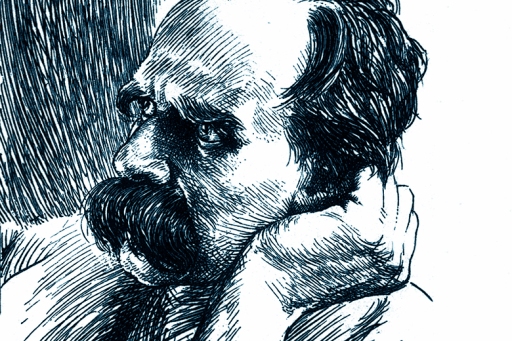
In the somewhat paradoxical “Oriental” style first used in the West by Heraclitus, one of few people for whom he made his admiration publicly known, Nietzsche believed human beings to be at once all alike, yet at the same time different. Also paradoxical is that no philosopher whose ideas were adapted for so many collectivist and social movements was actually more fiercely a champion of the individual than Nietzsche, the possible exception being Jean-Paul Sartre. Associating these two together is justified considering both of them have had their works misread, misrepresented, and misapplied and, likely because of these incongruities, both have been criticized as not being “real” philosophers. Both men’s writings have been used as support for everything from communism and fascism to atheism and post-modernism. Just like Sartre, Nietzsche refused to be pinned down, categorized, or made into one of any common herd. Finally, both were a champions of the authentic individual, something the “reluctant atheist” and also genius Sartre was to later concentrate on and make famous.
It is my contention that what first bothered Nietzsche, and stirred him to write at the outset, is something which was to later irk Sartre as well, essentially seeing the minds of his fellow men ever increasingly “going to mush”, turning to brainwashed Jell-O, reduced to following questionable, or better to say, too often unquestioned moral requirements, ethical proscriptions, and alleged facts and “truths”, all with little to no even analog in either historical or scientific reality. Since it was religious beliefs, more than any other contributor, that was most authoritative, and which established the alleged facts, biases, norms and mores of his day – and because it was (and maybe remains) the often unrecognized “invisible force” behind most customs and law – it was, and had to be, the predominant religion of Europe that was to receive the maxims and arrows that we know as Nietzsche’s criticisms.
Most of philosophy’s past, and the intellectual pursuit of facts and Truth, has been concerned with discovering the essence of things, and this ideally from a standpoint “on high”, an objectivity that Nietzsche saw as being more often than not the result of experiences and conclusions colored by prejudices nevertheless, seen through the rosy-colored glasses of the individual doing the reporting. Whether it is possible to take these blinding glasses off became a big philosophical issue.
On this matter we can notice that beginning with Nietzsche, or perhaps Kierkegaard, “existence” began to take priority over “essence”, and so since then we have had to contend with the Truth, yes Truth revealed, that each and every single thing or concept known to Man must first come to him through himself or another individual, and only once that happens can we make predictions and guesses as to what might be “behind” what we discover and invent. Similarly, you have no choice but to be free, as it is one thing to allow yourself to be carried away by the river, another thing to choose to board the raft. What seems safe to say is that for Nietzsche existence precedes essence – whether and whatever that essence may be.
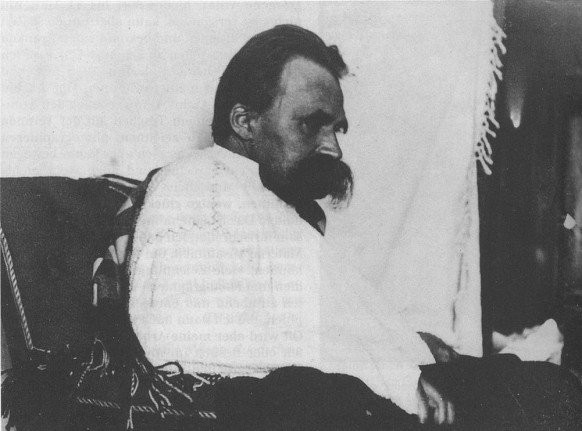
Would Nietzsche really say that there is no Truth? Would he, as his “commentators” so often insist, deny that there might be objective facts, or absolute Truth (Truth as I capitalize it)? Certainly not, and while maybe unrevealed, hidden, or obtained through other than normal cognitive means, and whether arrived at with great labor or instant insight, I don’t think he would have denied that there might be something else, or noumena behind the phenomena. Furthermore, he clearly intended his works to be taken seriously, as contributions to what we call knowledge.
All these factors taken together go a long way to supporting the claim that Nietzsche ought to be seen, more than nihilist or atheist, as a deist, a humanist, and the first genuine existentialist. The greatest of all modern philosophies in my opinion – a kind of almost “anti-philosophy” we could say – existentialism is the ultimate humanism and begins all inquiry always from a standpoint originating with a human individual. Whatever its origin might be, all knowledge comes immediately from Man; the tree that falls in the forest only makes a sound if someone is there to hear it, and whether it makes a sound when nobody is there can be guessed at, but never known for sure. Hundreds of us can stare at something in plain sight, until it is given a name it really has no existence. In traditional, normal societies these guesses would be put into the form of myths, and certainly ought not be taken as science or fact, as such guesses have too often been considered.
Once I was at a flea market and about a dozen of us had gathered around a strange-looking machine. None of us knew what it was. Oh it was there alright, real, plain as day, heavy enough nobody could budge it, existing there but unknown to any of us. Only when its owner showed up did he answer the question and tell us it was part of an old corn harvesting prototype machine. Here you can see clearly what it means for existence to precede essence. All the awareness telling us there was something there was no help in determining what that thing was. Only when it was named, and defined, did it exist to us as an identifiable object of inquiry.
Being an existentialist, it’s relevant to note here, was a label all the greatest existentialists either never heard about in their time, or flat-out denied being (sic.), “existentialism” being really unknown until 20th century philosophical historians started using it to pigeon-hole certain thinkers of the past. True existentialists refuse to be labeled anything, including “existentialist”, and it is this insistence on defying classification, more than other quality, than may actually serve to define them.
The thesis writers and other wiseacres, in their rush to categorization, have divided these existentialists further into atheistic and theistic branches, a difference which really comes down to how one would define theism, and God. Consider that the distinction between subjectivity and objectivity itself relies on a primordial and unitary subjective human nature. While we might debate about this general subjectivity’s origins and growth, its entelechy, it seems beyond doubt that any informational sustenance we might consume in our lives is directly placed before us, and so in a sense cooked up, by other human individuals. Our guiding mental dietary principle, as we peruse the menus and buffets of offerings, should be to fill our vessels with only carefully selected choices from among the myriad of recipes that come to our attention.
The goal for the existentialist, perhaps one other thing common to all existentialists, is what is called “authenticity”, the never-ending process of improving one’s self, the refusal to abide by any system unless abiding by that system be a coincidence, or the best choice at the time. Achieving authenticity is achieved by plucking from among the palette of Life’s known epistemological and ontological colors those hues which are most expressive of an individual’s essence, a crystallizing and distinguishing of one’s singular self from the vague and indistinguishable field of commonality.
Last chapter we discussed some of the problems with the herd mentality, that tendency to a strict ideological adherence that inhibits Truth and its pursuit. According to the existentialists an achievable objectivity might very well exist, but establishing such a point of view requires being completely unprejudiced and uninfluenced by prior conditioning, and must always begin from the standpoint of a subject, an individual. The difficulty of achieving this true objectivity, and whether Nietzsche thought such an objectivity is possible at all, is where he is most misunderstood.

As I say, Nietzsche believed in Truth and he believed in a God. Were it not for humanity, or more accurately, certain human individuals forging ahead, thrusting their unique selves into the world, all language, discovery, invention, creation, and myth would never come to be. Nietzsche made the world awaken to the fact that being “different” is neither heretical nor “bad” by anomaly alone, despite it being seen as such by the masses and herds. This is why he preferred myths over science when it comes to explaining matters of God and the Spirit:
Every culture that has lost its myths has lost, by the same token, the natural, healthy creativity…Only a culture ringed about with myths can unify a culture…
Here we have our present age, the result of a Socratism bent on the extermination of myth…
[and extremely important for us here…]
(…) underneath the hectic movements of our civilization, there dwells a marvelous ancient power, which arouses itself mightily only at certain grand moments and then sinks back again to dream of the future. (Birth of Tragedy, 136-138, my emphasis).
Nietzsche, therefore, believed in not just a “marvelous ancient power”, or simple Prime Mover, but a power that dwells, and moves, and thinks. There is much to evidence Nietzsche’s belief in the Power of Myth and Myths To Live By as explained by Joseph Campbell. There are, however, drawbacks and limitations to using myths as rational explanations for what exists and what occurs to us in the world, namely whenever these myths try to reduce Life to some sort of punishment, downgrade it as something to be despised in lieu of an afterlife, in short when such mythologies serve to deny Life. Many of the myths and ideas of the Romanized Christianity named after Jesus of Nazareth Nietzsche saw as being such a denial.
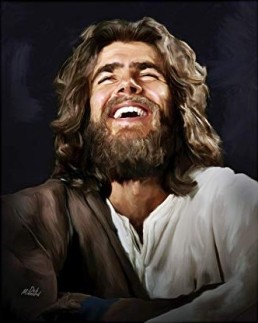
In Genealogy Of Morals, and speaking of Schopenhauer, Nietzsche explains:
[Human, All Too Human] was an attack. The point at issue was the value of the non-egotistical instincts, the instincts of compassion, self-denial, and self-sacrifice [I might add, patience…], which Schopenhauer above all others had consistently … “transcendentalized” until he came to see them as absolute values allowing him to deny life and even himself. (153-154, my brackets)
Would, or should, God have Man’s purpose on Earth be primarily suffering and self-denial? Nietzsche thought Life should be something celebrated, enjoyed, by which happinesses and pleasant experiences we rejoice in and prove the goodness of Life and God. He continues:
It was here [denial of Life, Life as punishment…] that I sensed the greatest danger for humanity…here I sensed the beginning of the end, stagnation, nostalgic fatigue, a will that had turned against life. (154, my brackets)
The God of Nietzsche is erroneously called “dead” or “non-existent” because his critics have misread his criticism of Christianity and the words of his characters as an endorsement of atheism and worse, nihilism, both charges for which, were he alive, I would recommend a slander suit:
This should take care once and for all, of the origin of “Our Holy Lord” – a single look at the Greek gods will convince us that a belief in gods need not result in morbid imaginations, that there are nobler ways of creating divine figments – ways which do not lead to the kind of self-crucifixion…in which Europe, for millennia now, has excelled. (227)

The line of infamy, from what is in my opinion his best book The Gay Science, is usually only quoted half way, by the way, as it actually reads “God is dead, we have killed him, you and I“, and more importantly, the “madman” follows it up later by saying “I have come too early…my time has not come yet”, indicating that the God of whom he speaks, when he was speaking, was not yet deceased:
The Parable of the Madman
Have you not heard of that madman who lit a lantern in the bright morning hours, ran to the market place, and cried incessantly: “I seek God! I seek God!” — As many of those who did not believe in God were standing around just then, he provoked much laughter. Has he got lost? asked one. Did he lose his way like a child? asked another. Or is he hiding? Is he afraid of us? Has he gone on a voyage? emigrated? — Thus they yelled and laughed.
The madman jumped into their midst and pierced them with his eyes. “Whither is God?” he cried; “I will tell you. We have killed him — you and I. All of us are his murderers. But how did we do this?…Are we not plunging continually? Backward, sideward, forward, in all directions? Is there still any up or down? Are we not straying, as through an infinite nothing? Do we not feel the breath of empty space?…Do we hear nothing as yet of the noise of the gravediggers who are burying God? Do we smell nothing as yet of the divine decomposition? Gods, too, decompose. God is dead. God remains dead. And we have killed him.
“How shall we comfort ourselves, the murderers of all murderers? What was holiest and mightiest of all that the world has yet owned has bled to death under our knives: who will wipe this blood off us? What water is there for us to clean ourselves? What festivals of atonement, what sacred games shall we have to invent? Is not the greatness of this deed too great for us? Must we ourselves not become gods simply to appear worthy of it? There has never been a greater deed; and whoever is born after us — for the sake of this deed he will belong to a higher history than all history hitherto.”
Here the madman fell silent and looked again at his listeners; and they, too, were silent and stared at him in astonishment. At last he threw his lantern on the ground, and it broke into pieces and went out. “I have come too early,” he said then; “my time is not yet…This deed is still more distant from them than most distant stars — and yet they have done it themselves.
It has been related further that on the same day the madman forced his way into several churches and there struck up his requiem aeternam deo [eternal rest of God]. Led out and called to account, he is said always to have replied nothing but: “What after all are these churches now if they are not the tombs and sepulchers of God?” (The Gay Science, Kaufmann, 1974, 181-82, my brackets)
My guess is he is modeling this madman after Diogenes the Cynic, whom you recall slept in a large pot or barrel, but is most remembered roaming through the streets of Athens with a lit lantern in the daytime because, he said, he was “looking for an honest man”. The point, once again, is that Nietzsche is distraught about what is happening to not only Truth, but the God concept.
All this reminds me of a trip I took, about ten years ago, to Quito, where I spent some time visiting a church museum inside of which, I was told, would be Christian art and other paintings. Large room after large room, gallery after gallery, six rooms at least with dozens of paintings in each place – I am not sure how many more there were as I didn’t make it through them all, so nauseous from what I saw I had to leave – there were pictures of a dying Jesus, with more blood and guts and sadness than any modern slasher movie. A church it was, but a place I could never, say, take a child. In fact, if I had to choose, I would rather take a 10 year old down an Amsterdam street, with hookers, dildos in the shop windows, pot shops, and all, than into that church. My reasoning is simple: I could better explain to that child what we would see in Amsterdam.
This is kind of how Nietzsche viewed this presentation of religion, exactly as portrayed by those well-meaning painters who, in their desire to evoke sympathy for their savior, instead in the end wound up evoking, in me for one, only feelings of hate, evil, murder, strife, sadness, skepticism, and bloodshed. Christianity to this day, in some ways, does seem to deny us good conscience after our following natural passions, for our wanting to forge ahead from the crowd, for pursuing uniqueness, or pride, or power, or self-assertions of any unconditioned type, for marginal language, for not following blindly the rules of men, and so on. Christians do not hang in their homes pictures of a smiling, happy, rejoicing Jesus, or with any frequency a Jesus of caring and compassion. What you see, and taken as symbolic of deity no less, is a sad, pitiful scene of a human impaled on a cross.
No, it is certainly not God “proper” that caused Nietzsche to feel the need to write The Anti-Christ, or write period, but rather it was the particular Romanized, Medieval, fire-and-brimstone corruption of godhead, and its accompanying denial of Life, that he felt to be anti-God, whose believers he would talk about in subsequent works as those who need to “go down”. The anti-Christ of Nietzsche will be the one who convinces the world they have been duped into following and worshiping a sham god. When that day comes, he said:
The will [will be] free once more and restore to the earth its aim, and to man his hope; this anti-Christ and ant-nihilist, must come (Kaufmann, op. cit., 600 et. seq., my emphasis and brackets).
More than believing in God, Nietzsche, I dare say, was as “God-intoxicated” a man as was Spinoza, or Descartes. The Christianity he saw practiced was, to his eyes, actually an evil practice, anti-religious in basic structure and contrary to his, and most of antiquity’s conception of God. His anti-Christ, whatever the other axe-to-grind critics will tell you, is really he who aims to destroy anti-religious sentiment and its life-denying influences perpetrated in God’s name.

VIII. Thus Spoke Nietzsche
With his introduction of his main character in Thus Spoke Zarathustra Nietzsche unleashed the prophecies of his allegorical messiah onto a European people he saw as being incessantly and ever more frequently mesmerized by what he considered to be a dogma contrary to Life. In Twilight Of The Idols (Kaufmann, op. cit., 467) he quipped:
In our own wild nature we find the best recreation from our un-nature, from our spirituality.
The profundity of this statement cannot be overestimated, and books could be written, indeed some have been written, in effort to accurately decipher it. In this quote we have a postulation saying that each of us individuals is composed of two aspects, a dualism consisting of 1) a wild nature and 2) an un-nature, which he treats here as synonymous with spirituality. I look at this simply as the stereotypical angel on one shoulder and the devil on the other, only they are indistinguishable by appearance alone; both always have something to say, both must always be considered. In every instance, at every moment of consequence in our lives, there is an inborn, automatic, instinctual, emotional, spontaneous aspect of our self, one which when negotiating each of these instances, events, and thought processes must contend with the learned, societal, ethical, and other prohibitive and cautionary requisites of the spiritual aspect of one’s self. Everything we see has an analog in our mind.
Notice that clearly Nietzsche is not eliminating the, or our, spiritual side. He is saying it has been misdefined, and misplaced, and erroneously given a weight more than the fifty percent maximum it ought rightly claim.
Taken all together, we find that much evidence does exist to show that Nietzsche believed in a power beyond Man, and of a human, all too human spirituality. It seems to me the only defense for those who would continue to deny Nietzsche a feeling of transcendence or, as we have seen, “belief” in God, as we have so far presented the case, would be for them to argue that a belief in spirituality or “transcendent power that thinks” does not necessarily imply a belief in God. I will respond to this objection in what follows.
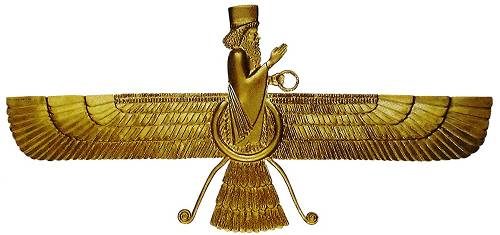
The real Zarathustra, or Zoroaster, is widely considered among scholars to be the founder of the first monotheistic religion. But really, Zoroastrianism recognizes two opposing but coexisting forces operating in the world, a good aspect and an evil aspect at odds with each other but at the same time necessary for each other, a complementary arrangement symbolized most effectively by the Yin-Yang symbol of the Tao, and which came first, Taoism or Zoroastrianism, is not so easy to say. Ormazd, or Ahura Mazda, you might envision as the light half of this dichotomy, and Ahriman, or Angra Mainyu (which I remember as “Angry Man”), as the dark half. As the light has dark aspects, and the dark has light – I am thinking specifically of the “dot eyes” and identical shapes of both halves of the Tao symbol – and as different and opposed as they are, they have some commonalities nevertheless; it is no accident that, like Siamese twins, they are portrayed as inseparably joined together. These are two aspects of one thing, two sides of the same coin, necessary for and dependent on each other. These forces, whether represented by Ormazd and Ahriman, or Yin and Yang, Good and Evil, Mental and Physical, transcendent and imminent, phenomenal and noumenal, relativistic and absolute, finite and infinite, light and dark, all of them and thousands more such dialectical possibilities operate in our world, in Nature, and in our psyches and decision-making processes.
According to Zoroastrianism, the Good, or Ormazd, will eventually defeat his antagonist the Evil Ahriman, and they will eventually merge completely, all things becoming Good, all being Ahura Mazda. Nietzsche’s choice of Zarathustra as his largest work’s protagonist is to illustrate by historical example a similar progression of spirituality, as well as the impetus motivating, or behind, the actions of this human spirit.
Those who continue to object and say someone who believes in spirituality, and transcendence, and in the existence of a thinking entity which fiddles around with the world, does not believe in God, must be using a specific definition of “God”, and insist the deity is of some pre-determined, human-constructed, or otherwise anthropomorphic type, perhaps the kind of imagined Almighty God who casts thunderbolts at evildoers and relegates transgressors whose actions he can foresee nevertheless to hell, and who at other times is like Nero, and declares favorites, rejoices in polygamy, and strums a lyre.
In the historical context, which I only summarized here, spiritualism has been the heart of the human condition. If we consider the words of the great Modernist thinkers, of which Nietzsche was one (as I have also demonstrated here, particularly for the Derrida and “deconstruction” types, he was no “post-modernist”…), we might even say a tendency to spirituality and metaphysical matters is the human condition. God and His existence, what something really is, how everything came to be, all these, and questions like them, have always been central to human thought.
To begin to wrap things up, let’s take a look at the following Nietzschean maxim:
There is a hatred of lies and simulation, stemming from an easily provoked sense of honor. There is another such hatred, from cowardice, since lies are forbidden by divine commandment. (ibid. 471)
This quote would serve well for discussing all types of values, values which Nietzsche felt had by his time become corrupted, altered in meaning, and in need, like the currency from time to time, of revaluation. The meanings of words, concepts, and things can and often do change over time, through misuse, non-use, altered meaning, advancement of technology, corruption, and more. Christianity was supposed to stand for certain values, and mean certain things, but when the “holy men” began to demand their doctrines, peddled under the name “Christian”, be believed under penalty of ostracism, flagellation, or even death – all irreligious propositions on any grounds, on top of being a terrible re-valuation of the original basis of Christianity – they altered the meaning, adopted it for their own use, corrupted the concept, and so to this day it stands in need of revaluation once again. Similarly, and very relevant today, we ought remark that democracy by force is fascism, or a least oppression, nonetheless.
Discussing the education of children, Aristotle talked about how to teach kids not to steal, and said that getting children to understand not to take what belongs to others because of the fear of punishment alone does not cause them to learn true respect for another’s property, or the larger virtue that we know as something like the Golden Rule, or the first form of Kant’s Categorical Imperative. Over two thousand years ago, Aristotle made it clear that only when the child learns why he should not steal, independently of any retribution for non-compliance, does that child learn the virtue.
When we do what is right to do, in any given instance, we either do so because we want to do what is right, or we do so to avoid a punishment. The second type is based on fear, or cowardice, on what would happen if we did what we really wanted to do, or reacted how we were first inclined to react. These two types of virtue are what is discussed in this maxim by Nietzsche.

Here we see more evidence of the Perennial Philosophy talked about by Bergson and made famous by Aldous Huxley, but really we see it is philosophical thought at least as old as Aristotle. It is the timeless, oft-repeated way of regarding the difference between learning true virtue by experience and reason, and sham virtue achieved by fear, coercion and law. There are those who hate lying because it hurts their dignity (“How dare he try to treat me like an ignorant fool..!”), or because saying what is known to be untrue compromises the reality of what ought be said, or because it misrepresents everything and everyone involved, or because, well, what would happen if everywhere people just lied, or how would you feel if I lied to you, etc. Conversely, there are some who believe that lying is wrong, but just because “it is said” to be wrong, or because of fear of being caught in the lie, or because God said so, or because liars might go to hell. In all these latter cases, the real virtue goes unlearned.
When all one needs to do is preface “God said” in front of something, and people will obey, then:
The concept of God becomes a tool in the hands of priestly agitators…everything else that is unnatural follows: a God who demands in place of one who helps, who devises means, who is at bottom the word for every happy inspiration of courage and self confidence. (Kaufmann, op. cit., 595)
Much of the criticism against Nietzsche comes from misreadings of Zarathustra by readers almost always unfamiliar with the rest of his works. When Zarathustra runs through the streets shouting “God Is Dead!” he is speaking to the people about the “God” who demands.
Nietzsche loved Life, and, as Zarathustra relayed, he “loved Man”. Instead of aspiring to ideals above the clouds, more often than not the products of some human’s wishes and/or imagination, which ironically symbolize all that mankind cannot reach, Nietzsche believed we should take Life, embrace it, affirm it and ourselves, take charge and form for the future our own heaven on Earth. In this way we do not slander the Earth and its innumerable wonders, and honor the Creation by continuing in its progressive image. By embracing what we have before us, and not worrying so much about the next life, or “the grass on the other side”, we can advance, and so take some charge of our own evolution, and at least try our best to make the world a better place for future generations. Denying Armageddon in this way, any foretold theologically or otherwise metaphysically-propagated human catastrophe in the future will not be ordained by God, but rather if it does come it will be directly caused by certain individuals given the autonomy to govern human affairs, and the power to cause such devastation.
In sum, how someone like Nietzsche could ever be considered the icon for nihilism and atheism is almost incomprehensible, especially if you consider this charge is usually levied by those who themselves see Earthly existence as a sort of punishment, and its beauties and pleasures as temptations to be avoided. It is these deniers of Life who fail to acknowledge the goodness of Creation, who deny Truth, and who spit in the face of the true God.

IX. Conclusion More Powerful Than a Locomotive
In The Anti-Christ and Zarathustra we find the definitive Dr. Nietzsche condensed, especially regarding his famous Frankenstein creation of the Superman, or the Overman (Übermensch):
Once the concept of “nature” had been invented as the opposite of God, “natural” had to become synonymous with “reprehensible”; this whole of fiction is rooted in hatred of the natural (of reality); it is the expression of a profound vexation at the sight of reality. (ibid. 582)
Before the Superman comes, the evolved human being who will surpass man, first must come the Last Man, the one born – through evolutionary, hereditary, and other now-inborn influences – to conform to the herd. We may know this Last Man because he will have separated the idea of God from the idea of Nature completely, so much so that they will become, not as in Zoroastrianism just antagonistic to each other, but as diametrically opposed, and completely separate. Men will see themselves, in the days before the advent of the Superman, as something apart from Nature, embracing their ethereal half, but denying their material half. Imagine the Yin Yang symbol but each one apart from the other, where the circle has become split into two semicircles with no connection at all. When the Superman comes, he will reunite the severed halves, and put them back together as one, giving to each again the respect they deserve, but recognizing them as one and the same, as dual aspects of but one reality – exactly as will be done by the historical prophet of Zoroastrianism:
We experience God [unfortunately] not as “god-like”, but as miserable, as absurd…as a crime against life. We deny God…in a formula: “Deus qualem Paulus creavit dei negato”. (ibid. 627, my emphasis)
Indeed, for Nietzsche, God as created by Paul is the negation of God as traditionally conceived since antiquity. The Superman is he who must come to destroy all religion that denies Life.
That Nietzsche was right is proven here also by recognizing that in the old days it was the strong that ruled, the brave that were lauded, the daring that were rewarded. It used to be that Power made the Authority. Today, when the exertion of strength is frowned upon or made irrelevant, when calling for police, or help of any kind, is not considered weak, when pride and dignity are considered non-virtues, etc., well, now today Authority makes the Power. Leadership is not determined any longer by moral, intellectual, or even physical worth, it is determined by money, by circumstance, and by mob rule, and all of it is acceptable, or at least accepted, because we have forgotten the qualities of what makes one a good leader. In Nietzsche’s terms, concerning here who would be in charge, it is clear why we need to revalue all our values.
Thus Spoke Zarathustra is Nietzsche’s Ode To Power, his parable for demonstrating his wish to have Man reserve his worship and reverence for the Life-giving, helping, understanding God, the deity we can feel and hear in our conscience if not express nor define with our words. This inexplicable nature of God, to recap, is thousands of years old, at least from Plato, and indicative of the global, eternal religions, believed in for eons, by peoples from all over the world.
In conclusion, would you say Nietzsche believed in God? Was he atheist, or nihilist? I think these charges may only be levied at him by those who believe in a certain type of Christianity, the Christianity taken over by the Romans and which later established the papacy. For even them, though, whether the charges are legitimate will depend on the definitions used. If belief in God means accepting myths and fables and things like revelations as being literally true, and requires that one must deny the flesh, and life, and pleasures, or that one must participate in quasi-cannibalistic rituals and speak mantric prayers and rites, or if one needs to be ascetic in thought and actions to be considered good to God, then clearly he did not. But if believing in God means using our will to exert influence into the world, or striving to better ourselves, or respecting but loving the Life given us, or following the inspirations of our hearts and minds, or embracing the beauteousness and miraculousness of Life, and if it means recognizing a Life ripe for human invention and creation for purposes and results both good or bad, and if you define God as equivalent to, or creator of, the Good, and Love, and Reason, and Virtue, and the Logos, and Nature, and so on, an essence the origin of, yet distinct from our physical existence, then Nietzsche not only believed in God, he was also a saint.
![]()




Adam
March 27, 2022 at 3:01 pm
What pretentious, presumptuous mental gymnastics. Nietzsche didn’t believe in God and you would know this if you had ever bothered to finish The Gay Science or Twilight of the Idols. Idiot.
The Overlord
March 28, 2022 at 7:14 am
It is you who need to read it all, Adam. Your complaints and parroting of the consensus understanding, in this case of Nietzsche vis-a-vis God, are exactly the type of accepted lies these writings mean to address. Rather than educate you beyond this suggestion which, let’s face it, might not be possible anyway, try reading some books by people who knew him. Just not by his sister. Good luck, Polly.
Cameron Boyce
March 7, 2024 at 8:27 am
That was…interesting